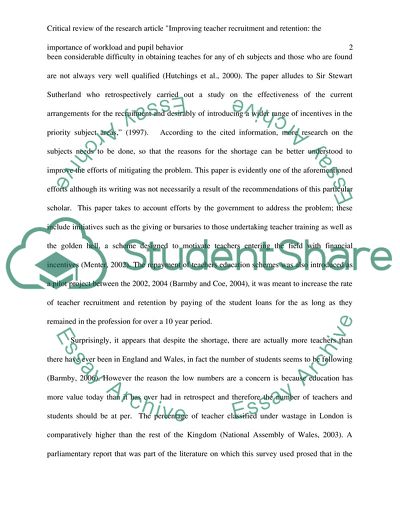Cite this document
(Improving Teacher Recruitment and Retention: The Importance of Workload and Pupil Behaviour Literature review Example | Topics and Well Written Essays - 2500 words, n.d.)
Improving Teacher Recruitment and Retention: The Importance of Workload and Pupil Behaviour Literature review Example | Topics and Well Written Essays - 2500 words. https://studentshare.org/education/1823989-critical-review-of-the-research-article-improving-teacher-recruitment-and-retention-the-importance-of-workload-and-pupil-behavior-barmby-pw-2006
Improving Teacher Recruitment and Retention: The Importance of Workload and Pupil Behaviour Literature review Example | Topics and Well Written Essays - 2500 words. https://studentshare.org/education/1823989-critical-review-of-the-research-article-improving-teacher-recruitment-and-retention-the-importance-of-workload-and-pupil-behavior-barmby-pw-2006
(Improving Teacher Recruitment and Retention: The Importance of Workload and Pupil Behaviour Literature Review Example | Topics and Well Written Essays - 2500 Words)
Improving Teacher Recruitment and Retention: The Importance of Workload and Pupil Behaviour Literature Review Example | Topics and Well Written Essays - 2500 Words. https://studentshare.org/education/1823989-critical-review-of-the-research-article-improving-teacher-recruitment-and-retention-the-importance-of-workload-and-pupil-behavior-barmby-pw-2006.
Improving Teacher Recruitment and Retention: The Importance of Workload and Pupil Behaviour Literature Review Example | Topics and Well Written Essays - 2500 Words. https://studentshare.org/education/1823989-critical-review-of-the-research-article-improving-teacher-recruitment-and-retention-the-importance-of-workload-and-pupil-behavior-barmby-pw-2006.
“Improving Teacher Recruitment and Retention: The Importance of Workload and Pupil Behaviour Literature Review Example | Topics and Well Written Essays - 2500 Words”. https://studentshare.org/education/1823989-critical-review-of-the-research-article-improving-teacher-recruitment-and-retention-the-importance-of-workload-and-pupil-behavior-barmby-pw-2006.


